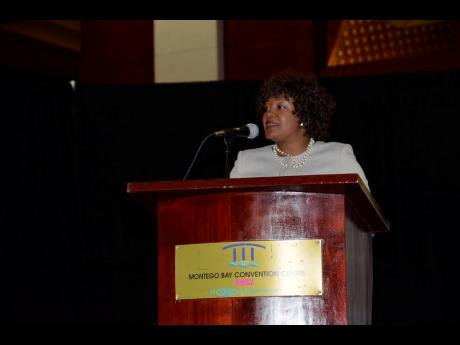250 parents participate in PATH project
The childrearing skills of some 250 parents across four parishes have been significantly boosted following their participation in the final phase of the Programme of Advancement Through Health and Education (PATH) Parenting Empowerment Project.
The parents, who hail from St Mary, Trelawny, Hanover, and Westmoreland, graduated from the six-month pilot training programme, which concluded with a ceremony at the Montego Bay Convention Centre in St James on November 7.
The participants were engaged in a series of workshops at the community level, focusing on key areas such as nutrition, discipline, safety, learning, and health needs.
The information shared at the workshops was reinforced with home visits by programme facilitators.
Speaking at the graduation ceremony, Chief Executive Officer for the National Parenting Support Commission (NPSC), Kaysia Kerr, encouraged parents that in disciplining their children for misdeeds, where deemed necessary, to do so with love, and not resort to coercive practices.
STRIKE CONVERSATION, NOT CHILD
She further urged them to “strike up a conversation and not your child”, a message being heavily pushed by the NPSC.
“Whether we like it or not, spanking our children is a form of abuse. Whether you like it or not, when you call them outside of their names, when you scream at them, we are abusing our children,” she emphasised.
“In a society where we have concerns about violence, in a society where we have concerns about aggression, in a society where we have concerns that people just don’t have any manners anymore, we have to now get back to a point where we are saying to our parents that we cannot continue to aggressively parent our children,” Kerr further underscored.
She invited the graduates to use their newly acquired skills to become ambassadors for effective parenting within their communities.
“Parents should lead by example … and because you have been a part of this programme, your leadership skills have improved. You now recognise yourselves as leaders of your family, [so] you have to now lead by example. We will continue to put to you thoughts to build your skill sets and encourage you, because we are in this together,” she added.
For her part, monitoring and Evaluation Manager for PATH Daynia Maragh said she is encouraged by the project’s preliminary results, citing steady improvements in parents’ behaviour, knowledge, and attitude, among the key out-turns.
“Home visitors report that at the end of the third of their five home visits, parents began to change their approach, and that many of the [parenting] practices they previously observed were vastly different,” she informed.
The PATH Parenting Pilot Project formed part of the Ministry of Labour and Social Security’s Integrated Social Protection and Labour Programme, which is funded by the Inter-American Development Bank.
Exceeded the targeted number
The programme was implemented in 90 communities and involved 1,500 PATH households, which exceeded the targeted number by approximately 300.
Among the aims of the broader programme are the support for the provision of PATH conditional cash grants, and strengthening the system through the introduction of parenting education for households with children aged two to six years old.
The workshops focused on promoting brain development with play, nutrition and budgeting, parenting styles and parent-child communication, self-esteem and self-image, preparing children for school, health and safety as well as self-empowerment for parents.


